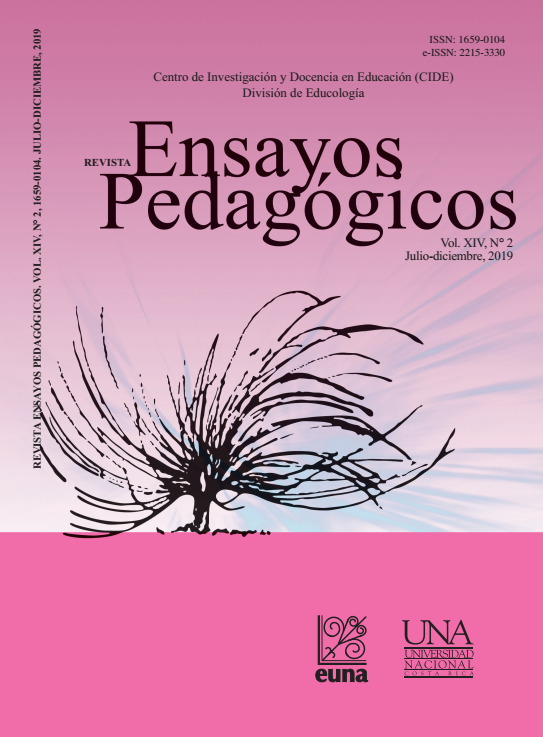Challenges for University Teaching from the Pedagogy of Autonomy
DOI:
https://doi.org/10.15359/rep.14-2.2Keywords:
autonomy, education challenge, university teaching, mediation, Paulo Freire, pedagogy, pedagogical praxisAbstract
Costa Rican high school education is stagnant in terms of quality due to a prevailing traditional educational model. Based on this, a student’s profile that enrolls at the university can be defined by an individual without personal opinion and lack of responsibility for his or her educational process. In order words, this student is not educated for his or her autonomy. For this reason, university teaching faces the challenge to foster autonomy processes in the students, in order to let them find in the university the space to develop personally and professionally. One of the pedagogical challenges happens mainly with first-year students, as they do not come prepared with certain necessary skills for university life; it is the professor who strengthens those abilities. One of the main tasks is found in pedagogical mediation. For this reason, this essay aims to address four specific aspects that university teachers should face to perform a pedagogical praxis focusing their mediation on Freire’s Pedagogy of Autonomy.
References
Avilés, G. (2012). Retos y desafíos de la educación costarricense. InterSedes: Revista de las Sedes Regionales, 13(26). Recuperado de http://www.redalyc.org/pdf/666/66624662006.pdf
De Fraga, R. (2015). Diccionario de Paulo Freire. Lima: Consejo de Educación Popular de América Latina y el Caribe.
Freire, P. y Shor, I. (2014). Miedo y osadía. La cotidianidad del docente que se arriesga a practicar una pedagogía transformadora. Buenos Aires: Siglo Veintiuno.
Freire, P. (2004). El grito manso. Buenos Aires: Siglo veintiuno.
Freire, P. (2004). Pedagogía de la Autonomía. Sao Paulo: Paz e Terra S. A. Recuperado de http://cidac.filo.uba.ar/sites/cidac.filo.uba.ar/files/revistas/adjuntos/UNIDAD%207%20-%20Freire%20Paulo%20-%20Pedagog%C3%ADa%20de%20la%20autonom%C3%ADa.pdf
Masi, A. (2008). El concepto de praxis en Paulo Freire. En Gadotti, M. et al. (Comp.), Paulo Freire. Contribuciones para la pedagogía (pp. 75-82). Buenos Aires, Argentina: CLACSO. Recuperado de http://bibliotecavirtual.clacso.org.ar/ar/libros/campus/freire/09Masi.pdf
Méndez, J. (2009). Educación Intercultural y Justicia Cultural. Recuperado de https://espanol.free-ebooks.net/ebook/Educacion-Intercultural-y-Justicia-Cultural
Sacristán, J. (s. f.). La construcción del discurso acerca de la diversidad y sus prácticas. Aulas de Innovación Educativa, 81. Recuperado de http://altascapacidadescse.org/pdf/la_construccion_del_discurso.pdf
Sanjurjo, L. (s. f.). Volver a pensar la clase. Presentación al 2.° Congreso Nacional de Educación del Este Cordobés “Nuevas perspectivas didácticas en el aula”. Recuperado de https://des-for.infd.edu.ar/sitio/upload/1466485945.Sanjurjo_Liliana_Volver_a_pensar_la_clase.pdf
Solano, J. (2013). El ser histórico en la pedagogía crítica. Costa Rica: EquipoCrítica.org. Recuperado de https://www.equipocritica.org/reflexion-editorial/editoriales-anteriores/el-ser-historico-en-la-pedagogia-critica/
Solano, J. (2017). Una mirada crítica de las dictaduras latinoamericanas durante la Guerra Fría mediante la Nueva Canción Latinoamericana (tesis de grado). Universidad de Costa Rica, Costa Rica.
Published
How to Cite
Issue
Section
License
Ensayos Pedagógicos is subscribed to the Attribution-NonCommertial-NoDerivatives 4.0 International Creative Commons Licence, which allows both authors and readers to freely download, store, copy, and distribute the final approved publisehd version of the manuscript (post-print) as long as this is done without commercial purposes, no derivative works are generated, and the source and author are mentioned. As well, Ensayos Pedagógicos declares that authors will remain the rightful owners of the copyrights of their work in perpetuity.







